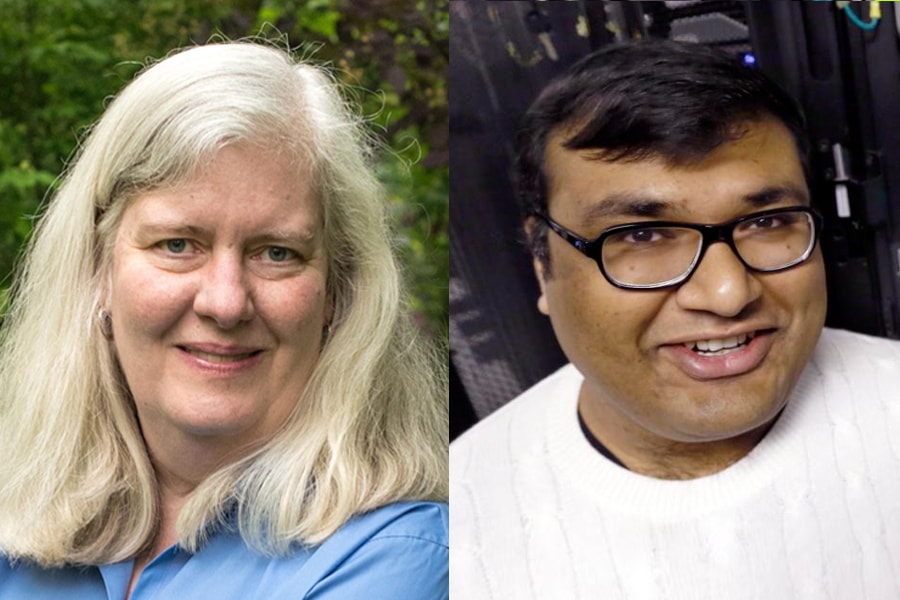Hodgins, Gupta Join Facebook AI Research
Byron SpiceTuesday, July 17, 2018Print this page.

Carnegie Mellon University's Jessica Hodgins will lead a newly established Facebook AI Research (FAIR) lab in Pittsburgh, where she will be joined by CMU's Abhinav Gupta. The appointments are part of an expansion of Facebook's artificial intelligence research activities with academic communities.
The FAIR Pittsburgh lab will focus on robotics, lifelong-learning systems that learn continuously, teaching machines to reason and AI in support of creativity. Yann LeCun, Facebook's chief AI scientist, announced the Pittsburgh lab and the expansion of FAIR labs in Seattle, London and Menlo Park, Calif., in a blog post today.
Hodgins, a professor of robotics and computer science, and Gupta, an associate professor of robotics, will work part-time with Facebook, maintaining their teaching and research duties at CMU. This dual-affiliation model is common across FAIR, LeCun noted, with researchers already splitting their time between FAIR and New York University, Georgia Tech, the University of Montreal, the University of Washington, University College London and Tel Aviv University, among others.
"Facebook's new lab will create new opportunities to make advances in AI, both at the company and at CMU," said Andrew Moore, dean of the School of Computer Science. "Even better, both Jessica and Abhinav will continue their work at CMU, helping us educate the next generation of AI scientists."
Similarly, Yaser Sheikh, CMU associate professor of robotics, has divided his time since 2015 between campus and Facebook, where he is now director of the Facebook Reality Lab.
LeCun said FAIR plans to support a number of Ph.D. students and provide research funding for Carnegie Mellon students and faculty. In addition to collaborations, FAIR also offers fellowships and emerging scholars programs for doctoral students.
"We created Facebook AI Research over four years ago to focus on advancing the science and technology of AI, and we've always done this by collaborating with local academic communities," LeCun said in his blog. "FAIR relies on open partnerships to help drive AI forward, where researchers have the freedom to control their own agenda. Ours frequently collaborate with academics from other institutions, and we often provide financial and hardware resources to specific universities."
Carnegie Mellon is a leading center for AI research and education, and was ranked number one for AI graduate programs by U.S. News and World Report earlier this year. The CMU AI initiative is further strengthening the university's AI efforts by connecting and supporting AI researchers across campus. This fall, the School of Computer Science will launch an undergraduate AI degree — the first at any U.S. university.
Hodgins, formerly vice president for research at Disney Research, focuses her work on computer graphics, animation and robotics with an emphasis on generating and analyzing human motion, which will also benefit the Facebook Reality Lab.
Hodgins last year was elected president of the Association for Computing Machinery's Special Interest Group on Computer Graphics and Interactive Techniques (SIGGRAPH). Last summer, SIGGRAPH presented her with its highest honor, the Steven Anson Coons Award for Outstanding Creative Contributions to Computer Graphics in recognition of her foundational work in character animation, her support and cultivation of emerging researchers, and her extensive volunteer service to the computer graphics community.
Gupta's research focuses on large-scale visual and robot learning, self-supervised learning, and reasoning. A faculty member since 2011, he has received the Office of Naval Research's Young Investigator Award, a Sloan Research Fellowship, a Bosch Young Faculty Fellowship and the Okawa Foundation Research Grant.
Byron Spice | 412-268-9068 | bspice@cs.cmu.edu
